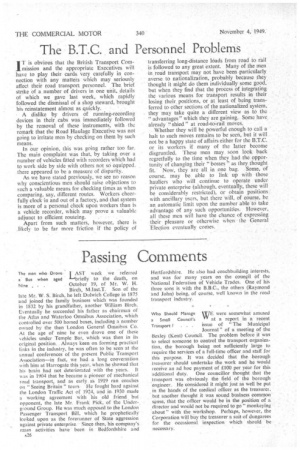The B.T.C. and Personnel Problems
Page 28

If you've noticed an error in this article please click here to report it so we can fix it.
' T is obvious that the British Transport Corn mission and the appropriate Executives will have to play their cards very carefully in connection with any matters which may seriously affect their road transport personnel. The brief strike of a number of drivers in one unit, details of which we gave last week, which rapidly followed the dismissal of a shop steward, brought his reinstatement almost as quickly.
• A dislike by drivers of running-recording devices in their cabs was immediately followed by the removal of these instruments, with the remark that the Road Haulage Executive was not going to irritate men by checking on them by such means.
In our opinion, this was going rather too far. The main complaint was that, by taking over a number of vehicles fitted with recorders which had to work side by side with others not so equipped. there appeared to be a measure of disparity.
As we have stated previously, we see no reason why conscientious men should raise objections to such a valuable means for checking times as when comparing, say, different routes. Workers cheerfully clock in and out of a factory, and that system is more of a personal check upon workers than is a vehicle recorder, which may prove a valuable adjunct to efficient routeing.
Apart from such matters, however, there is likely to be far more friction if the policy of transferring long-distance lOads from road to rail is followed to any great extent. Many of the men in road transport may not have been particularly averse to nationalization, probably because they thought it might do them individually some good, but when they find that the process of integrating the various means for transport results in their losing their positions, or at least of being transferred to other sections of the nationalized system, they may take quite a different view as to the "advantages" which they are gaining. Some have already "shied" at road-to-rail moves. Whether they will be powerful enough to call a halt to such moves remains to be seen, but it will not be a happy state of affairs either for the B.T.C. or its workers if many of the latter become disgruntled. These men may soon look back regretfully to the time when they had the opportunity of changing their " bosses " as they thought fit. Now, they are all in one bag. Some, of course. may be able to link up with those hauliers who will continue to operate under private enterprise (although, eventually, these will be considerably restricted), or obtain positions with ancillary users, but there will, of course, be an automatic limit upon the number able to take • advantage of any such opportunities. However, all these men will have the chance of expressing their pleasure or otherwise when the General Eleertion eventually conies.




















































































